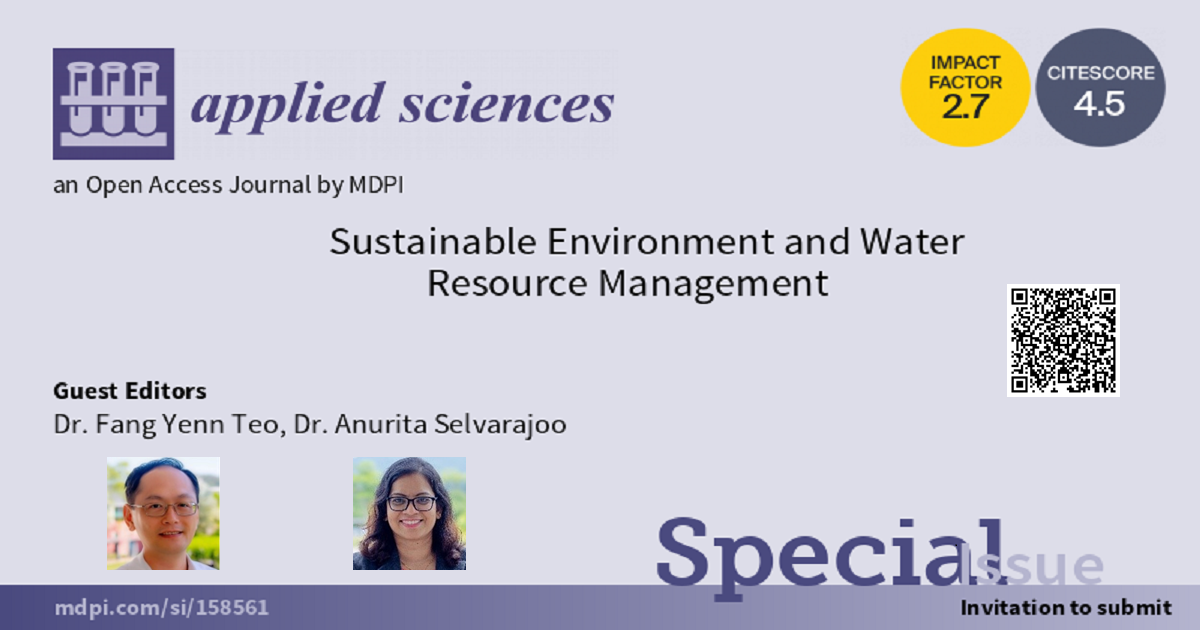- 2.5Impact Factor
- 5.5CiteScore
- 20 daysTime to First Decision
Sustainable Environment and Water Resource Management
This special issue belongs to the section “Environmental Sciences“.
Special Issue Information
Dear Colleagues,
This Special Issue is devoted to sustainable environment and water resource management in various research fields. Now is the time to address the world’s pressing water and environmental issues as we aspire to achieve more significant sustainable development for the good of the future. As part of our commitment to sustainability, the University of Nottingham Malaysia organised the 1st International Conference on Water and Environment for Sustainability in collaboration with the Malaysia Chapters of the International Association for Hydro-Environment Engineering and Research (IAHR) and the International Association for Coastal Reservoir Research (IACRR). The conference took place from 7 to 9 December 2022 at the Kuala Lumpur Convention Centre, Malaysia, concurrently with ASIAWATER 2022, the region’s leading international water and wastewater event in Asia.
Alongside “Towards Sustainable Water and Environment Management for the Future” as the theme, this international conference provided the essential platform for scientists, researchers, engineers, industry players, managers, and policymakers to engage, share and exchange the latest scientific knowledge, management approaches, and engineering solutions on water and environment in support of the adoption of the 17 United Nations Sustainable Development Goals (SDGs).
Sustainable management of global water and environment issues is fundamental for the achievements of all SDGs that can positively impact our world and provide a better future for all, including the improvement to the quality of life. Therefore, this Special Issue is welcoming all experts and will be provided the opportunity to share recent scientific knowledge, management approaches, and engineering solutions from different backgrounds of water and environmental related academia, research institutions, industry companies, non-government organisations, and government agencies.
Dr. Fang Yenn Teo
Dr. Anurita Selvarajoo
Guest Editors
Manuscript Submission Information
Manuscripts should be submitted online at www.mdpi.com by registering and logging in to this website. Once you are registered, click here to go to the submission form. Manuscripts can be submitted until the deadline. All submissions that pass pre-check are peer-reviewed. Accepted papers will be published continuously in the journal (as soon as accepted) and will be listed together on the special issue website. Research articles, review articles as well as short communications are invited. For planned papers, a title and short abstract (about 250 words) can be sent to the Editorial Office for assessment.
Submitted manuscripts should not have been published previously, nor be under consideration for publication elsewhere (except conference proceedings papers). All manuscripts are thoroughly refereed through a single-blind peer-review process. A guide for authors and other relevant information for submission of manuscripts is available on the Instructions for Authors page. Applied Sciences is an international peer-reviewed open access semimonthly journal published by MDPI.
Please visit the Instructions for Authors page before submitting a manuscript. The Article Processing Charge (APC) for publication in this open access journal is 2400 CHF (Swiss Francs). Submitted papers should be well formatted and use good English. Authors may use MDPI's English editing service prior to publication or during author revisions.
Keywords
- hydrology and water resources
- river, lake, estuary, and sea
- extreme events and climate change
- water supply and wastewater treatment
- environmental pollution and protection
- sustainable technology and engineering
- sustainable development goal
- sustainable environment

Benefits of Publishing in a Special Issue
- Ease of navigation: Grouping papers by topic helps scholars navigate broad scope journals more efficiently.
- Greater discoverability: Special Issues support the reach and impact of scientific research. Articles in Special Issues are more discoverable and cited more frequently.
- Expansion of research network: Special Issues facilitate connections among authors, fostering scientific collaborations.
- External promotion: Articles in Special Issues are often promoted through the journal's social media, increasing their visibility.
- e-Book format: Special Issues with more than 10 articles can be published as dedicated e-books, ensuring wide and rapid dissemination.

